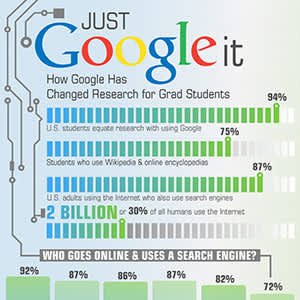Just Google It: How Google Has Changed Research for Grad Students
94: percentage of U.S. students who equate research with using Google, or other search engines.
75: percentage of students who use Wikipedia and online encyclopedias.
87: the percentage of all US adults using the Internet who also use search engines.
2 billion: Or nearly 30 percent of all humans, use the Internet
A history of online research
1962: J.C.R. Licklider of MIT has "Galactic Network" concept, a globally interconnected set of computers where everyone could access data from any site.
1989: Demonstration of the World Wide Web by Tim Berners-Lee.
1990: Public release of the World Wide Web.
1990: First search tool for the web (Archie) was created.
1993: First web crawler (Wanderer) was created.
1993: First graphical browser (Mosaic).
1994: Netscape browser launched.
1994: Development of first popular search engines (Alta Vista, Lycos, Excite and Yahoo)
1995: Internet Explorer launched.
1995: First public video-conference took place.
1996: Instant messaging services launched.
1997: Google released
1997: First weblog (blog) is attributed to Jorn Barger's Robot Wisdom Web site.
1997: SixDegrees.com is launched. Often seen as the first social networking site.
Paid placement ranking: Goto morphed into Overture and Yahoo. Ranking depended on how much you paid.
1998 +: Link based ranking pioneered by Google
• Blew away all search engines except Inktomi; meanwhile, Goto/Overture's annual revenues were nearly $1 billion.
2000: 400 million people across the globe use the internet.
2001: First commercial launch of 3G (Third Generation) mobile phones.
2001: First Access Grid developed at the University of Manchester.
2003: Myspace launched.
2003: Yahoo acquires Overture (for paid placement) and Inktomi (search)
2004: Mozilla Firefox web browser released (the 2nd most popular current browser after Internet Explorer).
2004: Facebook launched.
2006: Twitter launched.
2007: iPhone launched.
2008: Google Chrome browser launched.
2010: iPad launched.
2011: Number of internet users estimated as 2 billion world wide.
What is the percentage of people who go online, then use a search engine:
Millennials, age 18-33: 92 %
Gen X (34-45): 87
Younger Boomers (45-55): 86
Older Boomers (56-64): 87
Silent Generation (65-73): 82
G.I. Generation (74 plus): 72
All online adults (18 plus): 87
The battle of the Search Engines (as of 12/13)
Google: 66.7 percent of all searches
Microsoft sites (Bing): 18.2 percent
Yahoo: 11.2
Ask: 2.6
AOL: 1.4
Number of searches (worldwide: 18.3 billion in Dec. 2013)
Google: 12.3 billion of the 18.3 (or 66.7 % see above)
Microsoft (Bing): 3.3 billion
Yahoo: 2 billion
Ask: 452 million
AOL: 234 million
What are the top online research tools used by students
• Google or other online search engine: 94% of those surveyed
• Wikipedia or other online encyclopedias:75 %
• You Tube, or other social media sites: 52%
• News sites of major news organizations (i.e. NY Times): 25%
• Textbooks, electronic: 18%
• Databases, such as EBSCO, JSTOR: 17%
Google Research tools
Google Scholar (www.scholar.google.com) : for search of scholarly literature across many disciplines and sources, including theses, books, abstracts and articles.
Google App Engine: Google funds projects that create tools, applications and curriculum that can be used by other educators in their own teaching environments.
Google Book Search: (www.books.google.com) Search the latest index of the world's books. Find millions of great books you can preview or read for free.
YouTube EDU: Resources for learning, from English lessons to real-life math.
Chrome's FlashCards extension: to learn languages faster, prep for exams
Google Earth: with thousands of aerial and satellite photos, dozens of layers of information: city names, country borders, airport locations, road maps.
Google Play: has millions of FREE books readily available
Sources:
https://theconversation.com/us-study-shows-google-has-changed-the-way-students-research-and-not-for-the-better-3087
http://www.insidehighered.com/news/2011/08/22/erial_study_of_student_research_habits_at_illinois_university_libraries_reveals_alarmingly_poor_information_literacy_and_skills#ixzz2pd2IXJBX
http://searchengineland.com/teachers-say-students-equate-research-with-using-google-138542
http://searchengineland.com/search-number-2-online-activity-58927
http://www.stanford.edu/group/mmds/slides/raghavan-mmds.pdf
http://www.lightspeedaheadnewsletter.com/?p=317
http://www.bloomsburyacademic.com/view/What-Is-Online-Research/chapter-ba-9781849665544-chapter-002.xml?print
http://www.comscore.com/Insights/Press_Releases/2014/1/comScore_Releases_December_2013_US_Search_Engine_Rankings
The Pew Reseach Center's Internet and American Life Project Online Survey of Teachers
http://www.teachthought.com/technology/52-google-tips-for-college-students/
https://chrome.google.com/webstore/detail/flashcards/diejjofgldkjkhmfjagdjdodjebpglhb?utm_source=en-social-na-us-social-gplus-post
http://www.gearthblog.com/blog/archives/2012/08/back_to_school_with_google_earth.html
